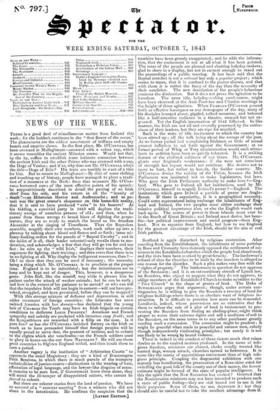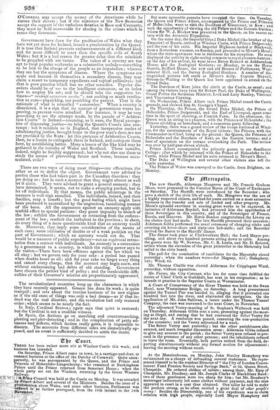Scotland is again disturbed by religious contention. After seceding from
the Establishment, the inhabitants of some parishes in Ross and Cromarty have riotously opposed the settlement of ministers in the Established churches which the people had abandoned; and the riots have been marked by great ferocity. The landowner's refusal of sites for churches to be built by the seceders is alleged as one reason for the disorder. Such a plea makes very free with the "rights of property." The landowners in question do not approve of the Secession ; and it is an extraordinary stretch of Lynch law, for Seceders, who object to support what they do not approve, to oblige members of the Established Church to make subsidies to the "Free Church" in the shape of grants of land. The Duke of SUTHERLAND urges that argument ; though, under certain contingencies, he is willing to give the Seceders a tenancy of land for religious buildings where there is an absolute want of religious instruction. It is difficult to perceive how more can be demanded. Landlords, indeed, whose possessions are so extensive that for them to refuse the sale of a plot of land is tantamount to preventing the Seceders from finding an abiding-place, might think proper to waive their extreme rights and sell a modicum of soil to the Seceders, on the same terms as to any other purchaser greatly needing such a concession. The concession might be prudent ; it might be graceful when made to peaceful and earnest men, calmly though independently vindicating principles ; but surely it is notone likely to be wrung by brutal violence. There is indeed in the conduct of these rioters much that raises doubts as to the exalted motives professed. In the name of religious freedom, ministers are chased, clerks cruelly treated like hunted dogs, women struck, churches turned to fortresses. It is more like the mania of superstitious excitement than of high religious principle. Coupling the disgraceful exhibition with one scarcely less humiliating, the prosecution of a Ross-shire witch for swindling the good folk of the county out of their money, the lowest estimate might be formed of the state of popular intelligence. Is this the spirit that the New Secession has evoked ? Granted that the Nonintrusion ministers may not have intended to produce such a state of public feeling—they are still bound not to use it for their purposes. Some of them, we ace, deprecate it : but they should also be careful not to take the smallest advantage from it. O'CormErs may accept the money of the Americans while he curses their slavery; but if the ministers of the New Secession accept the support of the turbulent fanatics in Ross and Cromarty, they must be held answerable for sharing in the crimes which in terms they denounce.



























